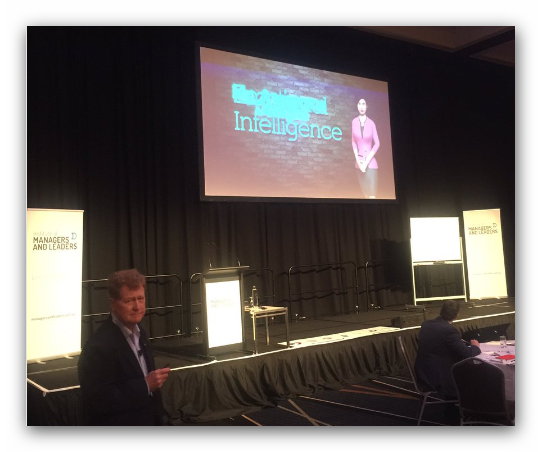Tim Wilke is available to speak to any group about,
- How to effectively engage with employees.
- How to be a successful leader.
- How to build a culture of continuous improvement and innovation.
Each presentation will be customised specifically for your organisation based on the challenges it faces.
Here is an overview of three presentations he currently offers around those topics
Presentation #1: How to motivate employees to do great work
Who is this presentation for?
- Business and Team Leaders, Managers, and those aspiring to leadership positions.
- Leadership and Business Coaches, Human Resources Professionals and those responsible for bringing about organisational change.
Why this presentation is important
Good leaders know which factors motivate employees to perform at their best. They also know that by developing strategies around these factors and then successfully implementing them, it will result in a high performance workplace.
For full profits organisations, this means greater profitability and sustainable growth. For the “not-for-profits” and government, it equates to improved efficiencies and effectiveness i.e. accomplishing more with less.
Learn how to:
- Motivate people and by doing so, take their performance to a much higher level.
- Create an environment where people look forward to coming to work each and every day.
- Reduce staff turnover, absenteeism and internal conflict.
- Make it easier for employees to perform at their best.
- Engender teamwork and collaboration in the workplace.
- Implement a performance management process that doesn’t involve annual performance appraisals.
Presentation #2: How to achieve Leadership Success in 60 days
Who is this presentation for?
- Business and Team Leaders, Managers, and those aspiring to leadership positions.
- Leadership and Business Coaches, Human Resources Professionals and those responsible for conducting Leadership Development Programs.
Why this presentation is important?
It’s a commonly held belief that you can successfully persuade people to do what you want by simply presenting them with a rational reason for doing so. Well you’ll be disappointed to hear that this is largely a fallacy. That’s because over 90% of the decisions a person makes are actually based on emotion. As a result, people respond best when you connect with them on an emotional level.
This doesn’t mean though that using logic isn’t important, it’s just that it makes up only a small proportion of the approach by which you positively influence people. And it’s this combination of using logic and emotionally-charged actions and words that’s forms the bases for what is known as the ROK Formula for Leadership Success (first introduced by Tim Wilke in his book, “Look Inside: Discovering the secret to leadership success“).
However, it’s one thing knowing what the Formula is but another thing altogether to successfully put it into practice. The reason being is that for most people, it requires changes in both mindset and behaviours. And everyone knows how difficult that can be to achieve.
Learn
- The basis of the ROK Formula for Leadership Success.
- How to successfully change your existing behaviour.
- About an array of ‘fun’ tools which aide in the behavioural-change process.
- How and when to use each of those tools.
Presentation #3: Why leaders fail and how to avoid it happening to you
Who is this presentation for?
- Business and Team Leaders, Managers, and those aspiring to leadership positions.
- Leadership and Business Coaches, Human Resources Professionals and those responsible for conducting Leadership Development Programs.
Why this presentation is important?
No one, including those who are highly intelligent, is immune to thinking errors and biases. That’s because most decisions that people make are not based on logic as many think, but instead are formed from general impressions, feelings, intuition and limited evidence. Which means that people tend to get things wrong more often than not.
So how does this apply to people in management and leadership positions? Well they too make thinking errors and as a result hold beliefs that aren’t always based on fact. A few of the more prominent errors being,
- The “better than average” effect.
- Confirmation bias.
- Nice guys/gals finish last.
- The “over-simplification” fallacy.
- The “curse of knowledge”.
- The “illusion of truth” effect.
- “Show me the money” fallacy.
- Giving “constructive” feedback improves employee performance.
- Not “reinventing the wheel” fallacy.
- The “Dunning-Kruger” effect
Why it is vital to actively participate in this presentation?
This presentation will briefly discuss the most common thinking errors that leaders and managers make. From there, it’ll go onto suggest a number of ways that you can fix them.
Fortunately though, very few people suffer from each and every error there is. So before you take action, it’s important that you identify those errors which specifically apply to you. Because, who after all, wants to waste time doing things they don’t have too.
For the rest of the presentation and afterwards, you will be asked to take up the challenge of generating solutions to your own leadership thinking errors which may or may not include the suggestions discussed previously. By being involved in this way, rather than just being told or shown what to do, you are more likely to implement those solutions. So when you 1) accept that you, like everyone else, makes thinking errors; 2) identify which errors you actually make and; 3) take the appropriate actions to correct them, you are well on the way towards becoming a better leader.
To contact Tim, please CLICK HERE

